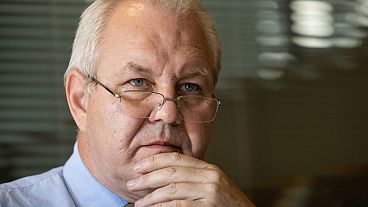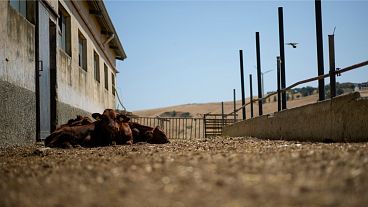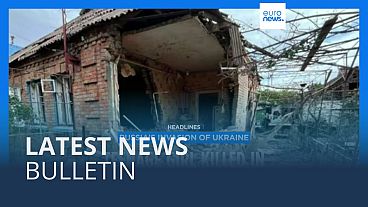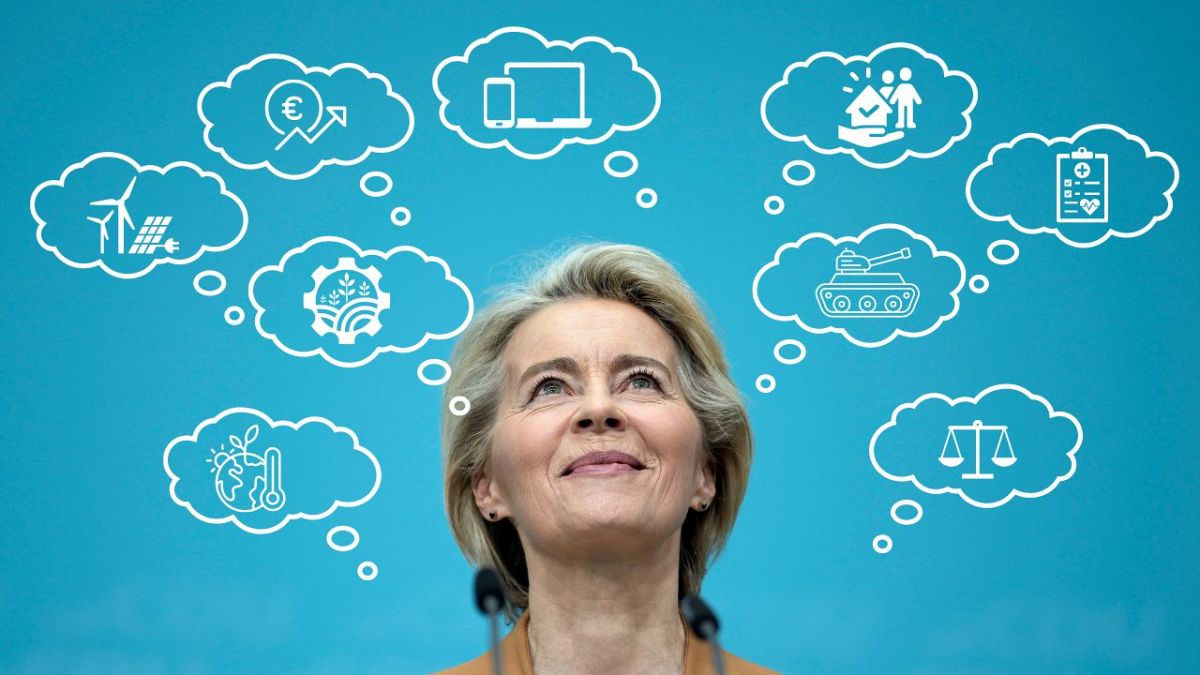After the summer, Ursula von der Leyen has some dream jobs to hand out, and some duff ones too. Euronews takes you on a journey from competition to multilingualism.
Over half of the EU’s 27 member states have now declared who they want to send to be European Commissioner – but we don’t yet know which positions they’ll hold.
Countries can express a preference among policy areas – and, as is traditional, many have said they want their top official in Brussels to be given a major economic portfolio.
But lots of them are going to end up disappointed. President Ursula von der Leyen has a huge amount of power to carve up policy issues and award them to her team.
Many of the positions she allocates will be given fancy titles, like Executive Vice-President – or exotic topics like demography.
But beware the spin: those crafty honorifics may just serve to disguise a non-job.
What really matters is the positions that wield power and influence. Ruling over one of the EU executive’s directorates-general gives a commissioner control over hundreds of officials who determine EU law.
Better still if it’s a portfolio where Brussels has substantive power or a likely political flashpoint.
What are the must-have portfolios, and which the symbolic scams? Will your country’s commissioner decide the EU’s future, or spend five years locked in a broom cupboard? Is it better to hand out billion-euro antitrust fines or dictate fish quotas?
For these answers and more, check out Euronews’ comprehensive, if entirely subjective, list of EU Commission portfolios to watch, starting from the most coveted.
1. God tier: Profile and power
President, Foreign and Security Policy, Competition, Economic and Financial Affairs
The highest-ranked posts have already been awarded by EU leaders – Germany’s von der Leyen to run the show, and Estonia’s Kaja Kallas to be the bloc’s top diplomat. Their jobs come with profile and power.
But ranked closely after are some influential economic portfolios – starting with the antitrust department that some view as Brussels’ core job.
The EU’s competition chief has extensive powers to block mergers, fine big companies, and ban state subsidies that distort markets – and, unlike most other EU commissioners, doesn’t need to sign off decisions with governments or MEPs.
The incumbent, Denmark’s Margrethe Vestager, has taken aim at big tech, with billion-euro cases involving alleged anticompetitive practices by Google and low tax bills enjoyed by Apple. She also presided over unprecedented, and controversial, handouts given to companies affected by COVID-19 lockdowns.
The portfolio will stay in the spotlight given von der Leyen’s promise of a “new approach” to merger policy. Vestager’s current role has been paired with responsibility for the digital economy – and we’ll be looking to see if her successor will also be given an extra role, such as promoting industrial policy or European strategic autonomy.
Also powerful is the Commissioner entrusted with the EU’s powerful DG ECFIN, which coordinates national economic policies and conducts dreaded forecasts of inflation and growth.
Eight countries have been formally warned by Brussels to temper high deficits, and the new economics commissioner will oversee the – politically painful – tax rises and spending cuts they’ll be required to make.
2. The rising stars
Enlargement, Defence, Industry, Digital
Some topics seem guaranteed a high political profile in the coming years.
Von der Leyen’s political guidelines, published in mid-June, show a renewed interest in industrial policy, as the bloc needs to rebuild its competitiveness.
A commissioner for defence, promised by von der Leyen in the wake of Russian aggression, will have a high-profile role that will need to have some difficult conversations with the bloc’s largely national militaries.
Guiding the EU’s process for enlarging to cover new members will also be crucial. That commissioner will have to determine if Ukraine and the many other candidates in the queue to join the EU meet detailed and stringent policy criteria.
And though the bloc has already agreed landmark laws to regulate artificial intelligence and digital services, the online economy is likely to continue to offer a challenge to policy makers, for which a digital commissioner will be responsible.
3. Close-behind tier: the golden oldies
Energy, Trade, Climate, Migration, Justice
Whatever the splendours of the recent past, some portfolios have lost their shine in recent years, fading into the background after a spell of dominance.
The EU has substantive powers to negotiate trade agreements on behalf of its members, and impose punitive tariffs on Chinese goods deemed to be dumped on the European market.
But its influence may be waning, with slow developments in talks with South America’s Mercosur group and India – though there’ll be a high-profile debate about how to respond to protectionism should Trump gain a second presidency.
Under Jean-Claude Juncker’s Commission, which ran up until 2019, Energy Commissioner meant something: leading the Clean Energy Act was a huge responsibility, and hugely boosted the career of Slovakia’s Maroš Šefčovič.
Energy policy had its moments under the last mandate, such as when the 2022 Russian invasion disrupted gas supplies. But incumbent Kadri Simson has been relatively anonymous; to be seen if her successor will elevate the profile.
On climate change, the EU still needs to implement some fairly controversial ideas from the Green Deal.
But it’s a far cry from the halcyon days of dominance in von der Leyen’s first term; her centre-right European People’s Party is clearly having second thoughts, as the mood shifts toward supporting clean industry.
Migration will continue to be a totemically important issue for the right, but the flagship policy has just been passed, and there’s a lack of real EU power.
The Justice portfolio – currently held by Belgium’s Didier Reynders – is a mixed bag including data privacy and consumer protection. But, with concerns about media freedom and judicial independence on the rise, this portfolio could come to set a bold new direction in protecting the rule of law across the bloc.
4. Middle of the table: Big bucks, small politics
Agriculture, Cohesion, Budget, Neighbourhood
These portfolios carry plenty of cash, but not much power.
They’re largely focused on implementing existing, if expensive, programmes: cohesion and agriculture together account for roughly two-thirds of the EU’s €170 billion-a-year spending – but the policy is already set by EU lawmakers.
Their moment of glory will come in mid-2025, when the Commission has to present a new proposal on the long-term future of the EU budget – and again if fractious farmers flare up again.
Likewise, we don’t see a huge role for the official covering countries in the EU’s neighbourhood, particularly if they compete with colleagues responsible for foreign policy, enlargement and the Mediterranean.
5. Trailing behind: ‘I wish I was a minister’
Home Affairs, Environment, Tax, Financial Services, Health and Food Safety, Employment and Social Rights, Transport, Fisheries
The job description of these posts sounds amazing and very ministerial – but for the extra detail that no, you’re not actually sitting in a national government.
Many big countries will be offered these portfolios, and might even be pleased with the prospect of a job that at least sounds important.
Don’t be deceived: the EU competence in these areas is either non-existent or politically unattractive. Food safety, anyone?
Many covet having power over issues such as financial services and social policy, and those portfolios are not worth nothing – but neither has had much political attention over the last mandate, and that’s likely to continue.
EU rules mean fiscal proposals are usually blocked by national vetoes – so the Commission’s tax and customs union portfolio would only be tempting for politicians who want to put “technical reforms to value-added tax” atop their CV.
That said, the right personality can get some good exposure from those roles, or use it as the springboard for something bigger – like Nicolas Schmit, the Luxembourger, the commissioner for jobs and social rights, who was the socialists’ candidate to head the European Commission.
6. The oh dear tier: totem and token
Housing, demography, foresight, the Mediterranean and “the EU way of life”
When she runs out of portfolios to offer, von der Leyen will get creative.
The recipients will be effusively grateful until they realise what their evocative title actually means, which is almost certainly nothing.
That’s what explains some of the out-of-the-box ideas in her current college, which includes commissioners for foresight (nope), demography (me neither) and the European way of life, whatever that means.
That seems set to continue in her next term, where she’s promised commissioners responsible for housing, which is a major and totemic policy issue that’s nothing to do with the EU, and for the Mediterranean, which is a sea.
Nice business card, shame about the policy.
7. The naughty step
Crisis Management, International Cooperation, Research, Interinstitutional Relations, Human Resources, Education and Culture
There’re some booby prizes lurking among von der Leyen’s clutch: the kind commissioners are warned they’ll get if they misbehave.
These are the least desirable portfolios, mostly dumped on smaller countries or clumped together with something more interesting.
Those involved in crisis management or international cooperation will get good air miles and Instagram content, but not much else.
The EU’s Research commissioner manages the Horizon Europe programme, but its budget is way less than cohesion funds or farm subsidies, and offers little in the way of policy development.
Likewise, education, youth and culture offers the glamour of association with the EU’s Erasmus student exchange scheme, but little in the way of substance.
Whoever gets told to deal with human resources or managing interinstitutional relations with the European Parliament and Council will find a purely inward looking role, with little glamour.
Others are a byword for a duff portfolio.
Former Commission President José Manuel Barroso famously created the multilingualism brief when Romania joined the bloc midway through his term; creating anything more substantial would have meant stripping someone else of duties.
Maybe that portfolio will be resurrected if some wayward government finds itself truly in Ursula’s bad books.












